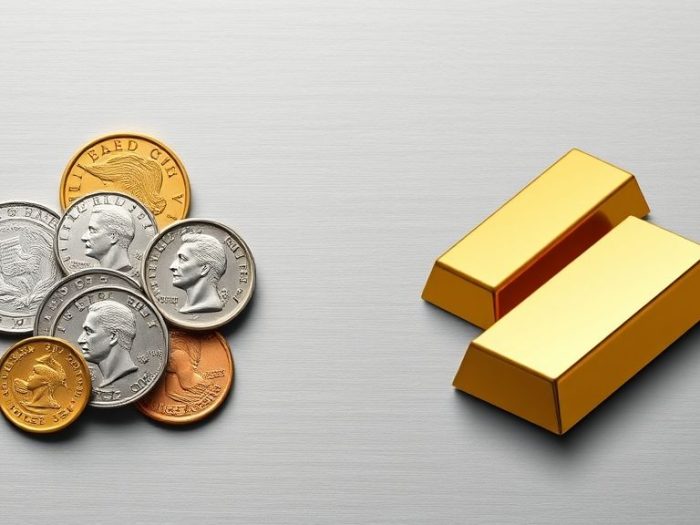Both rare coins and precious metals (like gold and silver) can be considered alternative
investments, but they differ significantly in their characteristics and potential returns.
This article compares rare coins and precious metals to help you determine which might be a
better investment for your portfolio.
Understanding Rare Coins
Rare coins, also known as numismatic coins, are valued not only for their metal content but
also for factors like:
- Rarity: The number of coins minted.
- Condition: The coin’s state of preservation.
- Historical Significance: The coin’s historical context and importance.
- Demand: Collector interest and market trends.
Understanding Precious Metals
Precious metals, primarily gold and silver, derive their value from their intrinsic properties
and use as a store of value.
Rare Coins vs. Precious Metals: A Comparison
| Feature | Rare Coins | Precious Metals |
|---|---|---|
| Value Drivers | Rarity, condition, history, demand | Metal content, industrial use, safe haven status |
| Price Volatility | Can vary widely | Generally lower than stocks but higher than cash |
| Storage and Security | Requires secure storage and insurance | Requires secure storage |
| Market Liquidity | Can be illiquid; selling may take time | Generally more liquid |
| Income Generation | No income generation | No income generation |
| Investment Horizon | Long-term (5-10+ years) | Long-term |
Which Makes a Better Investment?
The “better” investment depends on your goals and risk tolerance:
Rare Coins
-
Pros:
- Potential for high returns if you acquire rare and desirable coins.
- Tangible asset.
- Can be a hedge against inflation.
-
Cons:
- Requires specialized knowledge.
- Market can be illiquid.
- Subject to collector demand fluctuations.
- Risk of fraud and counterfeits.
- Suitable for: Collectors and investors with a passion for numismatics, specialized knowledge, and a long-term perspective.
Precious Metals
-
Pros:
- Store of value.
- Hedge against inflation and economic uncertainty.
- Relatively liquid.
-
Cons:
- No income generation.
- Price volatility.
- Storage and security costs.
- Suitable for: Investors seeking portfolio diversification, a hedge against economic uncertainty, and a store of value.
Conclusion
Rare coins and precious metals offer distinct investment opportunities. Rare coins are a
specialized investment requiring expertise and a long-term perspective, while precious metals
provide a more straightforward way to diversify and hedge against economic risks. Carefully
consider your investment goals, risk tolerance, and knowledge level before investing in either.
Related Keywords
Rare coins, numismatics, coin collecting, coin investment, precious metals, gold, silver,
invest in gold, invest in silver, alternative investments, coin grading, bullion, coin
appreciation, metal investing.
Frequently Asked Questions (FAQ)
1. What are rare coins?
Rare coins, also known as numismatic coins, are valued not only for their metal
content but also for factors like rarity, condition, historical significance, and
collector demand.
2. What are precious metals?
Precious metals, primarily gold and silver, are valued for their intrinsic
properties and use as a store of value.
3. What factors influence the value of rare coins?
Factors include rarity, condition, historical significance, and collector demand.
4. How does the condition of a coin affect its value?
A coin’s condition is crucial. Well-preserved coins are generally more valuable
than worn or damaged coins.
5. Are rare coins or precious metals more liquid?
Precious metals are generally more liquid, meaning they are easier to buy and sell.
Selling rare coins can sometimes take longer.
6. Do rare coins or precious metals generate income?
Neither rare coins nor precious metals generate income in the form of dividends or
interest.
7. What are the potential returns from rare coin investing?
Rare coins offer the potential for high returns if you acquire rare and desirable
coins, but returns are not guaranteed and require expertise.
8. What are the risks of rare coin investing?
Risks include market illiquidity, fluctuating collector demand, and the possibility
of fraud or counterfeit coins.
9. What are the benefits of investing in precious metals?
Benefits include their role as a store of value, a hedge against inflation and
economic uncertainty, and portfolio diversification.
10. Which is the better investment for me, rare coins or precious metals?
The better investment depends on your goals, risk tolerance, and expertise. Rare
coins are specialized, while precious metals offer a more straightforward way to
diversify and hedge against economic risks.



